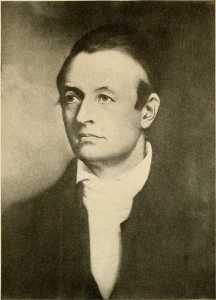My Brief Encounter with Adoniram Judson
Written By Benedict Tan, Malaysia
 I had not heard of Adoniram Judson until I came across the biography about him, “Adoniram Judson: How Few There Are Who Die So Hard!” by Bible teacher and theologian John Piper. Intrigued, I decided to read about this “obscure” missionary that Piper had taken time to write about. It was then that I found out that Adoniram was the first American Protestant missionary to preach the gospel in Myanmar.
I had not heard of Adoniram Judson until I came across the biography about him, “Adoniram Judson: How Few There Are Who Die So Hard!” by Bible teacher and theologian John Piper. Intrigued, I decided to read about this “obscure” missionary that Piper had taken time to write about. It was then that I found out that Adoniram was the first American Protestant missionary to preach the gospel in Myanmar.
Adoniram was born in 1788 and started out on a promising footing. He was raised by godly parents and entered Brown University as a sophomore aged 16. He graduated at the top of his class three years later. But it was also during this period of his life that he was lured away from the Christian faith by a fellow student.
His journey back to the faith began one night at a village inn. In the room next to where he was staying, he heard the groans of a dying man. He later found out that the man who had passed away was in effect the friend who had led him away from Christ! It was a rude awakening that caused Adoniram to reflect on his own life, and after many months of struggle, he committed his life to God.
On July 13, 1813, he and his newly-wedded wife went to Rangoon. That began “a life-long battle in the 108-degree heat with cholera, malaria, dysentery, [imprisonment] and unknown miseries that would take two of his wives and seven of his thirteen children, and colleague after colleague in death.”
Suffering appeared to be the main theme of Adoniram’s life, but it is not a word we like to hear. Most of us are comfortable where we are in life, with a good family, stability in studies or work, good friends, and a church where we feel comfortable in. Why would anyone want to give all these up for a difficult life in a foreign land? And yet, Piper writes that “God designs that the suffering of his ministers and missionaries is one essential means in the joyful, triumphant spread of the gospel among all the peoples of the world.”
I felt jolted and challenged by Piper’s book. I was amazed by the fact that six years passed before Adoniram and his wife baptized their first convert in Myanmar. It served both as an encouragement and a rebuke to me, as I recalled how tempted I had been to give up on evangelism after just a few tries.
It was interesting to read that Adoniram himself also had doubts in the gospel at certain points of his life. After the death of his wife and first daughter, Piper recorded that “self-doubt overtook his mind, and he wondered if he had become a missionary for ambition and fame, not humility and self-denying love.” He tried to lead an ascetic life, choosing to live in isolation and asking for his salary to be drastically reduced. And in spiritual despair he wrote at one point, “God is to me the Great Unknown. I believe in him, but I find him not.”
Despite the suffering Adoniram had to face and his battle with sin, however, God kept him serving in the mission field faithfully and gradually led Adoniram out of the darkness of desolation to hope and glory in the transforming power of the gospel. Piper noted that “the main legacy of his 38 years in Burma was a complete translation of the Bible into Burmese and a dictionary that all the later missionaries could use.” Piper also recorded that “today there are close to about 3700 congregations of Baptists in Myanmar who trace their origin to this man’s labours of love.”
In telling the story of Adoniram Judson, Piper strips away any preconceived notion of “glamor” about missions and shows us that it is painful and ugly. Missionaries may even die for their mission. Yet, Piper argues, dying is worth it. It is worth it because evangelizing to the nations is part of God’s mission. I found this a hard idea to stomach, and was forced to ask myself if I had made comfort and security my idols, and whether I was willing to die for the gospel. I finished the book shedding a tear or two.
Are you considering going on a mission or becoming a missionary? Do you find the idea of missions too abstract and distant? I would like to encourage you to read this biography and be inspired by Adoniram’s life. (Download the free eBook here.) May you also be challenged by Piper’s words: “The question for us is not whether we will die, but whether we will die in a way that bears much fruit.”










Leave a Reply
Want to join the discussion?Feel free to contribute!